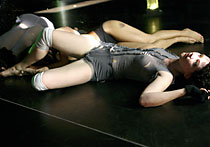With delicate features and a thin figure,
Yanira Castro looks like a dancer.
She carries herself lightly and glides gracefully into a room.
Her arms and hands move in swift fluid motions with every tale
she tells. Even her feet dance around as she speaks. Although
at this point in her career, Castro, 33, is everything but a
dancer, she, like the company she directs and choreographs, moves
ever so smoothly to the beat of her own drum.
Formally founded in 1997, Yanira Castro + Company (YCC) is a
New York-based ensemble of dancers and designers who combine
experiments in movement with original music, costumes, text and
visual elements to create rich and contemporary performances.
With lighting designer Roderick Murray, they construct site-based
installations specific in theme and energy to each performance.
The space adds environment and mood and can even lend its history
to the piece.
The company’s next project, "Beacon," presented by
Dance Theater Workshop and the Brooklyn Lyceum, opens on Jan.
7 in Park Slope’s Brooklyn Lyceum.
"[In site-based installation projects] the piece is not
about the site, but inspired and influenced by the site,"
Castro said. "It could be performed somewhere else, but
it would be a completely different experience."
Set in the Lyceum, a 94-year-old former public bathhouse, "Beacon"
aims to explore the disruption in everyday routines caused by
news, whether personal, familial, national or international.
The performance is intended to be intense and uncomfortable,
yet cathartic. Exploding out of a confined area, four women scamper,
trip and jerk across the space to the industrial and emotional
fusion of keyboard and violin music composed by William J. Grabek
Jr.
"I envisioned the piece in a large space, and that’s what
this is," Castro said. "[A public bathhouse] is a warehouse
for humanity, a vulnerability of the naked human body."
Although the four dancers on stage are clothed – the trio in
long, black coats and the soloist in a thin, light-beige, transparent
coat – there is still a sense of exposure in their movements.
In costumes designed by Albert Sakhai, the trio, baring only
legs, is "infectious," Castro says, in their formal
and minimal mirror images, while the soloist is much more fragile.
"[With this piece] I tried to create a phrase and then destroy
it so that it stops having a natural flow," Castro said.
"It’s an interrupted organic flow that travels through many
emotional states."
Inspired by ancient Greek tragedies as well as modern-day horrors
in the news, "Beacon" takes its audience members through
the stages that lead up to and follow a violent event.
"I’ve been particularly affected by the beheadings and the
footage in which the victims plead for their lives," Castro
said.
Castro began working on "Beacon" two years ago, when
the United States military was already in Afghanistan and preparing
to invade Iraq. What makes Castro’s piece so effective is the
sense of removal it personifies. Apart from 9-11, Americans are
largely distanced from the violent and catastrophic events that
plague parts of the Middle East and Russia, for example, every
day. There is a break in time between the actual event and our
mental and emotional reaction, disrupting both the flow of the
event and our personal lives. The movements of the dancers embody
that disruption.
In order to watch "Beacon," members of the audience
will be separated from the people they arrive with and corralled
into four viewing pens – seating areas for approximately 17 that
are surrounded by Plexiglas and a curtain.
To create a site-based installation project, YCC undergoes various
stages of development before making the actual piece.
"It starts out as a nascent idea for making work about some
issue or idea," Castro said. "From there I work with
the movement. The performers improvise around the emotional state
of the issue and develop it to make it their own."
After the movements are in place, YCC shares it with the dance
community to get a feel for the work. From there Castro begins
the daunting task of finding the "perfect" space.
"I knock on a lot of doors until I find the place that calls
to me," she said.
Before finding the "perfect" space at the Lyceum, Castro
visited at least three other locations for "Beacon."
Not until the location is selected can the installation truly
begin. The group’s past site-based installations include: the
Judson House in Manhattan, before it was torn down, and the Old
American Can Factory in Gowanus.
Although Castro did not properly begin pursuing a career in dance
until she was 17-years-old, her passion and eye for the art goes
without saying. After a six-month internship with Ping Chong,
a theater director, choreographer and video and installation
artist, during a semester spent in Manhattan, Castro received
bachelor’s degrees in Theater & Dance, and in Literature,
from Amherst College in 1994. Upon graduation she came directly
to New York City as a struggling artist. Since the early years
of a city subway piece and an overcrowded apartment, Castro has
performed and taught master classes throughout the eastern United
States.
But YCC is unlike a traditional dance or theater group in that
it has no specific agenda or genre that it follows. Castro hones
in on everyday raw experiences and emotions for the world to
see.
"We cannot capture the entire realm of all that happens,
but we can expose a tiny sliver that allows the audience into
the space, like a beacon or shaft of light," Castro said.
Many elements – environment, mood and movement – shape YCC’s
work, but how it is interpreted is left for the viewer to grapple
with.
"I try to create an experience that I think requires the
audience to come with an openness," Castro said. "I
am interested in questioning, and challenging [the audience].
I want to create a moment of collective experience with emotional
surroundings."
Dance Theater Workshop and Brooklyn
Lyceum present Yanira Castro + Company’s "Beacon" at
the Brooklyn Lyceum (224 Fourth Ave. at President Street in Park
Slope) Jan. 723. Performances are Friday and Saturday at
7 pm and 9 pm, and Sunday at 6 pm followed by a Q&A session.
Tickets are $20 per seat, $15 for standing room if the show sells
out. Visit www.gowanus.com
to reserve tickets, or call the DTW box office (212) 924-0077.
For more information, call (718) 866-GOWANUS.
























